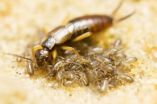(Press-News.org) When choosy moms choose Jif peanut butter and sports fans who call themselves sports fans subscribe to DirecTV, identity marketing is hard at work. But what happens when this type of advertising misses the mark? According to a new study in the Journal of Consumer Research, when a person's sense of ownership and freedom is threatened they are less likely to respond positively to identity marketing campaigns.
"While people may be drawn to brands that fit their identity, they are also more likely to desire a sense of ownership and freedom in how they express that identity. Identity marketing that explicitly links a person's identity with a brand purchase may actually undermine that sense of freedom and backfire," write authors Amit Bhattacharjee (Dartmouth College), Jonah Berger (Wharton School of the University of Pennsylvania), and Geeta Menon (New York University).
The researchers ran a series of five studies that compared two types of identity marketing, messages that simply referenced consumer identity or messages that explicitly tied consumer identity to a brand purchase. Participants were first asked to answer questions about the importance of a given identity in their overall life. They then viewed an advertisement for a brand that appealed to that specific identity. The advertisement used a headline that either referenced the identity or explicitly linked it to a brand. Participants then rated their likelihood to purchase a product from within the brand.
Study results showed that explicit identity marketing messages backfired with consumers who cared about the specific identity and resulted in a lower likelihood to purchase the product. This information may help brands understand why some people react negatively to products used in important areas of their lives.
"Contrary to the traditional thinking about identity marketing, our research shows that people who care deeply about an identity are not receptive to messages that explicitly communicate how a brand fits with their lifestyle," the authors conclude. "In fact, to restore their sense of freedom, some people may avoid purchasing a product that otherwise appeals to them and fits with who they are."
INFORMATION:
Amit Bhattacharjee, Jonah Berger, and Geeta Menon. "When Identity Marketing Backfires: Consumer Agency in Identity Expression." Journal of Consumer Research: August 2014. For more information, contact Amit Bhattacharjee or visit http://ejcr.org/.
When identity marketing backfires: Consumers don't like to be told what they like
2014-04-15
ELSE PRESS RELEASES FROM THIS DATE:
Sibling cooperation in earwig families gives clues to early evolution of social behavior
2014-04-15
Looking at the question of how social behavior has developed over the course of evolution, scientists from the universities in Mainz and Basel have gained new insights from the study of earwigs. "Young earwig offspring don't simply compete for food. Rather the siblings share what is available amongst themselves, especially when the mother is absent," explained Dr. Joël Meunier of the Evolutionary Biology section of the Institute of Zoology at Johannes Gutenberg University of Mainz (JGU). The team of biologists from Mainz University and the University of Basel investigated ...
Charitable donation discrepancies: Why are some countries more generous than others?
2014-04-15
When it comes to charitable giving, some countries open their collective wallets more than others. According to a new study in the Journal of Consumer Research, people who live in countries that promote equality in power and wealth are more likely to donate money than those who live in societies that expect and accept inequality.
"Our research examines whether cultural values can explain the different levels of charitable giving between different countries," write authors Karen Page Winterich (Pennsylvania State University) and Yinlong Zhang (University of Texas, San ...
Chew on this: How does food texture impact its perceived calorie content?
2014-04-15
Food is an intimately personal thing; we savor some tastes and despise others. But how does the way we chew and eat our food impact our overall consumption? According to a new study in the Journal of Consumer Research, people perceive foods that are either hard or have a rough texture to have fewer calories.
"We studied the link between how a food feels in your mouth and the amount we eat, the types of food we choose, and how many calories we think we are consuming," write authors Dipayan Biswas, Courtney Szocs (both University of South Florida), Aradhna Krishna (University ...
Consumer predictions: Do categories matter when predicting the lottery or stock market?
2014-04-15
From sports to the stock market and even winning the lottery, it's in our nature to predict who or what will come out on top. But, sometimes we can't see the forest for the trees. According to a new study in the Journal of Consumer Research, people are more likely to make a prediction about something when it is grouped in a large category of similar items.
"One factor that can contribute to a person's flawed judgment is categorization," write authors Mathew S. Isaac (Seattle University) and Aaron R. Brough (Utah State University). "When making a prediction, we can become ...
Can refined categorization improve prediction of patient survival in RECIST 1.1
2014-04-15
In a recent analysis by the RECIST Working Group published in the European Journal of Cancer, EORTC researchers had explored whether a more refined categorization of tumor response or various aspects of progression could improve prediction of overall survival in the RECIST database. They found that modeling target lesion tumor growth did not improve the prediction of overall survival above and beyond that of the other components of progression. The RECIST Working Group includes the EORTC, the United States National Cancer Institute, and the National Cancer Institute of ...
New method isolates immune cells for researchers to study how they ward off oral diseases
2014-04-15
Case Western Reserve University dental researchers have found a less invasive way to extract single rare immune cells from the mouth to study how the mouth's natural defenses ward off infection and inflammation.
By isolating some specialized immune cells (white blood cells known as "leukocytes") to study how they fight diseases in the mouth—or reject foreign tissues, such as in failed organ transplants—researchers hope to learn more about treating and preventing such health issues as oral cancers, cardiovascular disease, AIDS and other infectious diseases.
To this point, ...
Study: Deforestation could intensify climate change in Congo Basin by half
2014-04-15
By 2050, deforestation could cause temperatures in the Congo Basin to increase by 0.7 °C. The increase would intensify warming caused by greenhouse gases by half, according to a study by researchers at the University of Leuven, Belgium.
Explosive population growth and inefficient agricultural practices are causing large-scale destruction of tropical rainforests in Central Africa. A team of researchers from the University of Leuven examined how these practices will affect longer-term temperatures in the region. Using a sophisticated computer model, they forecasted Congo ...
Saturn's rings reveal how to make a moon
2014-04-15
Disturbances in the icy rings of Saturn have given scientists an insight into how moons are made.
Writing in the journal Icarus this week, Professor Carl Murray from Queen Mary's Astronomy Unit reports that recently discovered disturbances at the very edge of Saturn's outer bright A ring result from a small icy object that formed within the ring and which may be in the process of migrating out of it. They have nicknamed the object, 'Peggy'.
"We hadn't seen anything like this before," explained Professor Murray. "We may be looking at the act of birth, where this object ...
A screening process for early identification of infants at risk of autism
2014-04-15
The aim of this study was to develop a screening tool to identify infants prior to 12 months at risk for autism spectrum disorder (ASD) and developmental learning delay (DLD) and provide immediate determination of risk for autism spectrum disorder. The importance of early detection and treatment for children with ASD has been well documented. Since 2006, the American Academy of Pediatrics has recommended routine screening measures for toddlers at risk for ASD at 18 and 24 months of age, however the authors of this study were not aware of any screening questionnaires available ...
Researchers help Boston Marathon organizers plan for 2014 race
2014-04-15
After experiencing a tragic and truncated end to the 2013 Boston Marathon, race organizers were faced not only with grief but with hundreds of administrative decisions, including plans for the 2014 race – an event beloved by Bostonians and people around the world.
One of the issues they faced was what to do about the nearly 6,000 runners who were unable to complete the 2013 race. The Boston Athletic Association, the event's organizers, quickly pledged to provide official finish times for these runners. Thinking ahead, they also had to consider how to provide these runners ...


